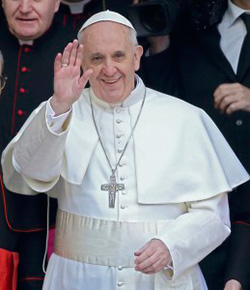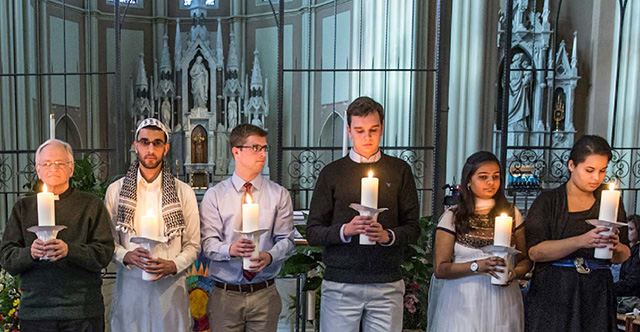
What Is Francis Really Saying About Climate Change and Economic
Inequality?
By Fr. Dennis Hamm, SJ
Our pope is full of surprises — from eschewing the papal
suite to washing a Muslim woman’s feet on Holy Thursday. Last year, he offered Laudato Si, a challenging
encyclical on climate change and the world economy. Some people find all of
this “radical.”
Let’s slow down and attend to what he is actually saying.
Francis is partaking in something quite traditional. Since 1891
when Pope Leo XIII wrote Rerum novarum, the first papal encyclical applying
Catholic moral principles to social issues, popes have commented on the economy
as a matter of Christian faith. The human race has only recently begun to
recognize how we are endangering our common home. Our popes have not been far
behind. Popes St. John Paul II and Benedict XVI both spoke about the growing
ecological crisis and are cited in Laudato Si, alongside the Compendium of
the Social Doctrine of the Church. Ultimately, Laudato Si is a timely and
urgent update of a long-held tradition.

|
| Fr. Dennis Hamm, SJ (left), participates in an interfaith prayer service at Saint John’s Parish at Creighton University. (Courtesy of Fr. Don Doll, SJ) |
While our media insist on treating climate change as a controversy with symmetrical “sides,” Pope Francis accepts that global warming triggering melting glaciers, rising sea levels, and extreme weather events is a fact, largely caused by human burning of fossil fuels and exploitative land management. He reminds us of our Jewish/Christian vision regarding the divine gift of creation and our human charge to care for it. He also spells out “the human roots of our ecological crisis,” specifically identifying “the technocratic paradigm.” While he celebrates the benefits of technological progress, Francis condemns greed and self-centeredness, attitudes that might be caricatured this way: “I am the center of what is valuable in this universe; everything and everybody else is ‘raw material’ for me to manipulate for my purposes.”
His encyclical’s fourth chapter describes integral ecology, which essentially means a study and vision that includes the human species along with other forms of life. The pope laments that a small but powerful minority wields economic power in a way that works against the vast majority of humanity in a disproportionate and unsustainable use of Earth’s resources. He affirms the global market as essential but insists that it should not take on a cancerous life of its own. Though he says nothing about capitalism, Francis insists that the global market should be focused first on meeting human needs and the integral development of all.
These observations and analyses lead Francis to urge practical efforts and to discuss the roles of education and spirituality. Technical solutions alone, however, will be ineffective unless we learn how everything is connected and allow ourselves to be converted by the grace of our creator.
Our fascinating and challenging pope is not wandering outside his “wheelhouse.” He is doing exactly what a pope is supposed to do: bringing traditional Catholic social teaching to bear on the issues of the day. Our call is to learn from his teaching and live out that vision as faithful citizens of the planet’s most powerful nation, serving the common good of an endangered species, the human family.
Please click for the Spring 2016 Jesuits magazine index.
Fr. Dennis Hamm, SJ, is a professor emeritus of theology at Creighton University in Omaha.